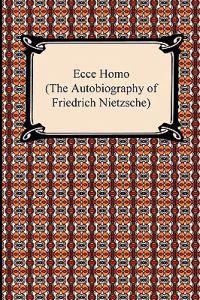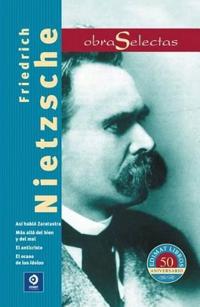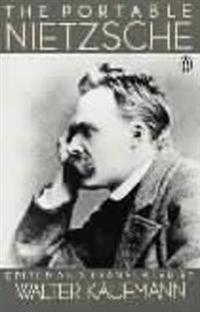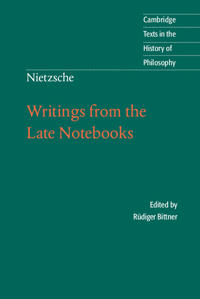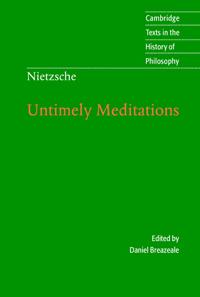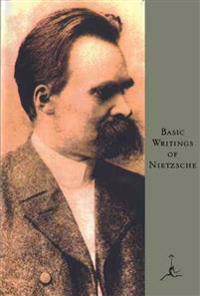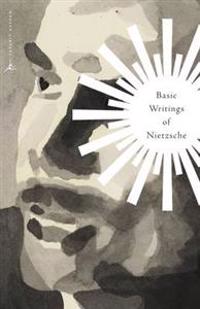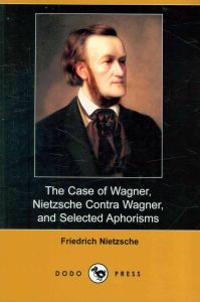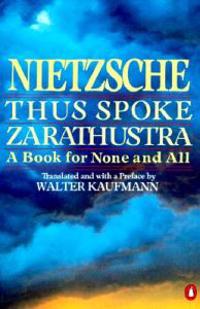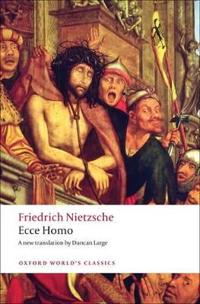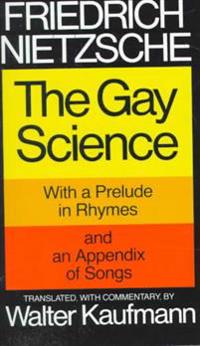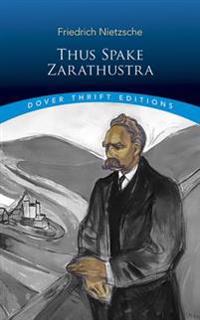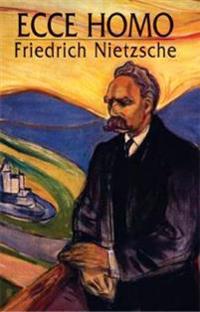The Selected Writings of Friedrich Nietzsche (Inbunden)
avMencken, H. L., Nietzsche, Friedrich Wilhelm
ISBN: 9781604593334Collected here in this omnibus edition are three of Nietzsche's three most important books: The Anti-Christ, Beyond Good and Evil, and Thus Spake Zarathustra, as well as The Philosophy of Friedrich Nietzsche by Henry Louis Mencken. A perfect book for new readers of Nietzsche or anyone hoping to unde[...]
Ecce Homo (the Autobiography of Friedrich Nietzsche) (Häftad)
avFriedrich Wilhelm Nietzsche
ISBN: 9781420932263 - UTGIVEN: 200901Selected Letters of Friedrich Nietzsche (Häftad)
avFriedrich Wilhelm Nietzsche, Oscar Levy
ISBN: 9781503148468 - UTGIVEN: 2014-11Friedrich Nietzsche: Asi Hablo Zaratustra / El Ocaso de Los Idolos / Mas Alla del Bien y del Mal / El Anticristo (Inbunden)
avFriedrich Wilhelm Nietzsche
ISBN: 9788497941402 - UTGIVEN: 2013-10The Portable Nietzsche (Storpocket)
avFriedrich Wilhelm Nietzsche, Walter Arnold Kaufmann
ISBN: 9780140150629 - UTGIVEN: 199412The works of Friedrich Nietzsche have fascinated readers around the world ever since the publication of his first book more than a hundred years ago. As Walter Kaufmann, one of the world's leading authorities on Nietzsche, notes in his introduction, "Few writers in any age were so full of ideas", an[...]
Nietzsche: Writings from the Late Notebooks (Häftad)
avFriedrich Wilhelm Nietzsche
ISBN: 9780521008877 - UTGIVEN: 200302For much of his adult life, Nietzsche wrote notes on philosophical subjects in small notebooks that he carried around with him. After his breakdown and subsequent death, his sister supervised the publication of some of these notes under the title The Will to Power, and that collection, which is text[...]
Nietzsche: Untimely Meditations (Häftad)
avFriedrich Wilhelm Nietzsche
ISBN: 9780521585842 - UTGIVEN: 199711The four short works in Untimely Meditations were published by Nietzsche between 1873 and 1876.They deal with such broad topics as the relationship between popular and genuine culture, strategies for cultural reform, the task of philosophy, the nature of education, and the relationship between art, [...]
Nietzsche (Pocket)
avFriedrich Wilhelm Nietzsche, Maudemarie Clark, Brian Leiter
ISBN: 9780521599634 - UTGIVEN: 1997-11Daybreak marks the arrival of Nietzsche?s ?mature? philosophy and is indispensable for an understanding of his critique of morality and ?revaluation of all values?. This volume presents the distinguished translation by R. J. Hollingdale, with a new introduction that argues for a dramatic change in N[...]
Nietzsche (Pocket)
avAdrian Del (EDT) Caro, Robert B. (EDT) Pippin, Friedrich Wilhelm Nietzsche
ISBN: 9780521602617 - UTGIVEN: 2006-07Nietzsche regarded 'Thus Spoke Zarathustra' as his most important work, and his story of the wandering Zarathustra has had enormous influence on subsequent culture. Nietzsche uses a mixture of homilies, parables, epigrams and dreams to introduce some of his most striking doctrines, including the Ove[...]
Nietzsche, The Gay Science (Inbunden)
avFriedrich Wilhelm Nietzsche
ISBN: 9780521631594 - UTGIVEN: 2001-08Nietzsche wrote The Gay Science, which he later described as ?perhaps my most personal book?, when he was at the height of his intellectual powers, and the reader will find in it an extensive and sophisticated treatment of the philosophical themes and views which were most central to Nietzsche?s own[...]
Nietzsche: The Gay Science (Pocket)
avFriedrich Wilhelm Nietzsche
ISBN: 9780521636452 - UTGIVEN: 2001-08-23A new translation and edition of this important and influential statement of Nietzsche's philosophy.
Nietzsche: The Birth of Tragedy and Other Writings (Häftad)
avFriedrich Wilhelm Nietzsche
ISBN: 9780521639873 - UTGIVEN: 1999-04The Birth of Tragedy is one of the seminal philosophical works of the modern period. Nietzsche?s discussion of the nature of culture, of the conditions under which it can flourish and of those under which it will decline, his analysis of the sources of discontent with the modern world, his criticism[...]
Basic Writings of Nietzsche (Inbunden)
avFriedrich Wilhelm Nietzsche
ISBN: 9780679600008 - UTGIVEN: 199407Introduction by Peter Gay
Translated and edited by Walter Kaufmann
Commentary by Martin Heidegger, Albert Camus, and Gilles Deleuze
One hundred years after his death, Friedrich Nietzsche remains the most influential philosopher of the modern era. "Basic Writings of Nietzsche" gathers the [...]The Basic Writings of Nietzsche (Häftad)
avFriedrich Wilhelm Nietzsche
ISBN: 9780679783398 - UTGIVEN: 200101Introduction by Peter Gay
Translated and edited by Walter Kaufmann
Commentary by Martin Heidegger, Albert Camus, and Gilles Deleuze
One hundred years after his death, Friedrich Nietzsche remains the most influential philosopher of the modern era. "Basic Writings of Nietzsche" gathers the [...]The Case of Wagner, Nietzsche Contra Wagner, and Selected Aphorisms (Dodo Press) (Häftad)
avFriedrich Wilhelm Nietzsche
ISBN: 9781406599404 - UTGIVEN: 2008-10Thus Spake Zarathustra (Pocket)
avNietzsche, Friedrich Wilhelm
ISBN: 9781420929133"Thus Spake Zarathustra" is the fictional account of the travels and teachings of Zarathustra, known also as Zoraster, the Persian prophet and founder of Zoroastrianism. What Nietzsche is portraying here is a new or different Zarathustra though, one with a morality alternate to that of the tradition[...]
The Anti-Christ (Pocket)
avNietzsche, Friedrich Wilhelm
ISBN: 9781599866314The Anti-Christ is a work originally published in 1895 and written by philosopher Friedrich Nietzsche. This is a book which is seen as an assault by Nietzsche on the institution of Christianity and focuses on the "slave morality" and the apathy of Western Christianity. Believeing that Christianity i[...]
Beyond Good & Evil (Pocket)
avNietzsche, Friedrich Wilhelm
ISBN: 9781600474682 - UTGIVEN: 2010-07-15Beyond Good and Evil considers the origins and nature of Judeo-Christian morality; the end of philosophical dogmatism and beginning of perspectivism; the questionable virtues of science and scholarship; liberal democracy, and nationalism.[...]
Beyond Good and Evil (Pocket)
avNietzsche, Friedrich Wilhelm
ISBN: 9781605121512Are traditional notions of morality actually the means of enslaving the human spirit? This is the claim of Friedrich Nietzsche in Beyond Good and Evil. Nietzsche is one of the most controversial of European philosophers. His bold attacks on Christianity, and the advocacy of a fearless approach to th[...]
Thus Spoke Zarathustra (Pocket)
avFriedrich Wilhelm Nietzsche, Walter Arnold Kaufmann, Friedrich Wilhelm Nietzsche
ISBN: 9780140047486 - UTGIVEN: 197801Ecce Homo (Pocket)
avFriedrich Wilhelm Nietzsche, Duncan Large, Friedrich Wilhelm Nietzsche
ISBN: 9780199552566 - UTGIVEN: 200910'I am not a man, I am dynamite.' Ecce Homo is an autobiography like no other. Deliberately provocative, Nietzsche subverts the conventions of the genre and pushes his philosophical positions to combative extremes, constructing a genius-hero whose life is a chronicle of incessant self-overcoming. Wr[...]
The Gay Science (Pocket)
avFriedrich Wilhelm Nietzsche, Walter Arnold Kaufmann, Friedrich Wilhelm Nietzsche
ISBN: 9780394719856 - UTGIVEN: 197410Nietzsche called The Gay Science "the most personal of all my books." It was here that he first proclaimed the death of God -- to which a large part of the book is devoted -- and his doctrine of the eternal recurrence.Walter Kaufmann's commentary, with its many quotations from previously untranslate[...]
Thus Spake Zarathustra (Pocket)
avFriedrich Wilhelm Nietzsche, Thomas Common, Friedrich Wilhelm Nietzsche
ISBN: 9780486406633 - UTGIVEN: 199901Ecce Homo (Pocket)
avFriedrich Wilhelm Nietzsche, Anthony M. Ludovici, Friedrich Wilhelm Nietzsche
ISBN: 9780486434162 - UTGIVEN: 200404The Gay Science (Pocket)
avFriedrich Wilhelm Nietzsche, Thomas (RTL) Common, Friedrich Wilhelm Nietzsche
ISBN: 9780486452463 - UTGIVEN: 2006-11


